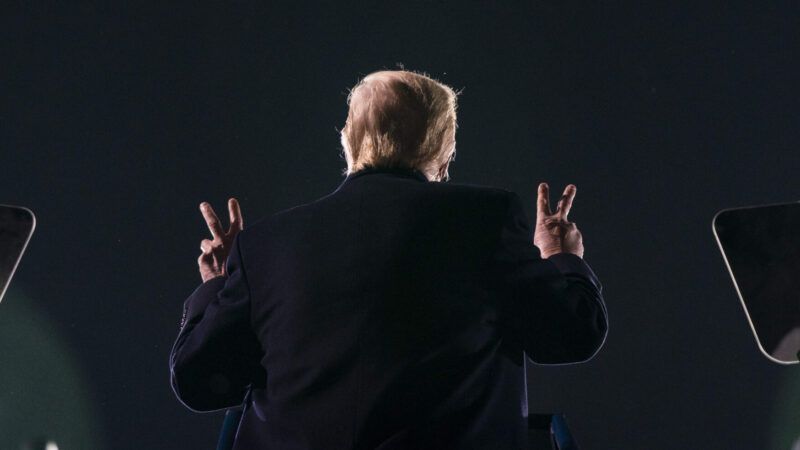Trump Romps Through Iowa Caucuses, Calls for GOP to 'Come Together'
DeSantis appears to be on track to claim second place, a distant 30-ish percentage points behind Trump.

Former President Donald Trump took his first official step toward winning a third consecutive Republican presidential nomination on Monday, as he handily won the Iowa caucuses.
So comprehensive was Trump's win that major networks called the race for the former president less than an hour after the caucuses began, with only a smattering of votes officially reported—and before voting had even started at some caucus sites. By 11 p.m., with about 93 percent of the vote counted, Trump had secured 51 percent of the vote. He appeared to be on track to win at least 16 (and likely many more, once the final results are tabulated) of the state's 40 delegates to this year's Republican convention, according to The New York Times' tracker.
Speaking in Des Moines late on Monday night, Trump celebrated his victory by declaring that "this is time now for everybody, our country, to come together"—a remark that could be seen as a call for the party to fall in line as Trump seeks to be the first person since former President Richard Nixon to be nominated three times for president by a major party. "We are going to come together," Trump said. "It's going to happen soon."
"We don't even know what the outcome of second place is," Trump added with a bit of a smirk.
Indeed, while there was no doubt about the winner on Monday, the caucuses did not provide a definitive answer to the other big question in the GOP primary: Which candidate can claim to be the top alternative to Trump?
By late Monday night, Florida Gov. Ron DeSantis appeared on track to finish a distant second with about 21 percent of the vote, while former South Carolina Gov. Nikki Haley was nipping at his heels with about 19 percent.
DeSantis had bet heavily on a good performance in Iowa to save his foundering campaign. He'd achieved the feat of visiting all 99 counties in the state during the race, but late on Monday night he did not appear to be winning even a single county and had to settle for finishing roughly 30 points behind Trump.
DeSantis' campaign released a statement on Monday night sharply criticizing the media for calling the race so early—a fair point, even though it seems highly unlikely to have changed anything.
Haley is polling well ahead of DeSantis in the next two states scheduled to vote—New Hampshire and her home state of South Carolina. If the race for second place means anything, those contests may prove to be more important than the results in Iowa.
Entrepreneur Vivek Ramaswamy appeared to be heading for a fourth-place finish with about 8 percent of the vote.
The Iowa caucuses are always a low-turnout affair, but bad weather across the state on Monday and the widespread perception that Trump was running away with the race likely reduced participation this year.
Relatedly, it's worth keeping in mind that despite all the attention showered on the Iowa caucuses, the first-in-the-nation nominating contest has done a poor job in recent decades of determining the Republican nominee. In each of the past three Republican primaries without an incumbent president in the race, the winner in Iowa went on to lose the nomination: former Arkansas Gov. Mike Huckabee in 2008, former Sen. Rick Santorum (R–Pa.) in 2012, and Sen. Ted Cruz (R–Texas) in 2016.
Trump's margin of victory in Iowa far exceeds each of those three races, none of which were decided by more than nine percentage points. In fact, his performance in Iowa was arguably the best ever by a non-incumbent Republican, ahead of the high water mark set by George W. Bush, who won 41 percent of the vote there in 2000.
It's still too early to make any definitive statements about the Republican nomination, but Monday's result reflects what numerous polls have already shown: This is Trump's race to lose.


Show Comments (122)